On discovering queerness at divinity school, with the Rev. Molly Bolton
And how the Cleveland Clinic chaplain uses poetry to empower teens
The poet Molly Bolton (she/they) is a remarkable person. I first met Molly in the context of a writing class on pregnancy loss. I had lost a daughter-to-be at 21 weeks; Molly lost twins, River and Wren, at around the same time. Through that class, I learned that she was planning to host her own class, on poetry. I was inspired to take that class, and then another one with her, and then somewhere along the way we became friends. After all, what makes for more compelling conversation fodder, for more instant intimacy, than being able to talk about death, sex, religion and poetry from the get-go?
Molly, who has worked at the Cleveland Clinic as a chaplain, is the kind of person who can walk around a hospital wing full of sick and dying people with a book of verse in her hand, offering exactly what is needed to each, and somehow walk out fully alive at the end of each shift. She also works with teenagers, as I do, teaching them sex-positive sex education.
In this interview, Molly lays out the other initiations that led her to create this life for herself, including:
Canceling her “Christian marriage” at twenty-one
Beginning to explore her queerness in divinity school
Moving to the Appalachian Mountains with her partner,
Building a life for the child she’s expecting, very soon (My hope is to check in on Molly on the other side of that tender initiation, so you may see her again in these pages after today.)
Some housekeeping notes before we begin: Molly has noted that she’s “not picky” about pronouns, but does use both she/they, so you’ll see “she” in the body and “they” in the NOTES. You may need to click into the browser to read the entirety of her inspiring interview. All photos come from her archives. I hope you enjoy them as much as I do. Finally, we began our conversation about initiations because this was the prior focus of my newsletter, before I switched to asking people about caregiving and mindfulness. And I’ve found that the question of how people define “initiation,” and go on to talk about their first big one, has always been a powerful place to begin.
Let’s get into it!
Ryan: How do you define “initiation”?
Molly: Something came up that I was sort of surprised by when I was thinking about initiation. It has to do with when I almost, as I call it now, got “Christian married” when I was 21. It encapsulates a lot of different parts of my story. Because the reason I almost got Christian married when I was 21 was to have sex.
I grew up in purity culture, with no real sex education, which was common in the early 2000s, even for folks who were mainline Christians like my family. I didn't know about relationships. But with this person that I almost married, there was a sensual erotic awakening.
What I had with this person would've been great to have when I was much younger, with an understanding of consent, and boundaries, and queerness. But I didn’t. What I did have was a sense that “This type of intimacy, this type of desire, is very natural. There's nothing wrong with this, right? It's expansive. It's for myself, but it's shared with other people. It's very good.”
At the same time, there was this external message of purity culture–that “This is wrong, bodies are wrong, and this is only for very specific settings.”
I was sending out save-the-dates when I was 20 and 21 – and then imploding. I was like, “I should not get married. This is stupid.”
That awakening, for me, was about opening the door of “These stories I’ve received are lies. Life is more expansive than that.”
That's when I really started getting into poetry. And that's also when I decided to go to divinity school.
So I think about that when I think about initiation. The crumbling of the Christian ideal, and the awakening of my curiosity about more expansive ways of living, and about different frameworks for the erotic and for desire.
Ryan: Who was the child-Molly who grew into the person who had both the potential to get “Christian married” at 21, and also the potential to say “f@# that” and go in a completely different direction?
Molly: Looking back, especially through a queer lens, at my life, it's like, “Oh my God, I had a crush on that girl on my volleyball team. What the f@#? I had no idea.” But there was a queerness about me always. I always wanted to have a bowl cut and be playful and curious.
I'm the youngest of four–so with being made fun of at a young age, I learned how to not take shit, but I was very sensitive too, and wanted to be kind.
I think that the desire to be playful and ethical is still true to who I am. I just did not have the framework for what my ethic was. I was given a [conservative Christian] framework, but then in my awakening, there was a realization that this is not my ethic. Because my desire to be ethical is about wanting everyone to flourish, to receive healing, to be in their bodies, and to be liberated.
How long did that take me? I had inklings about it. Like, when I was 18, I read “Wild Geese.” How many people's lives has this poem changed? I read: you do not have to be good. And I was like, what the fuck? I didn’t even know that that was an option. [Ed: I wrote about how much I love this poem recently too.]
Ryan: And to let the soft animal of your body love what it loves, right? I mean, that's super queer. And of course Mary Oliver was. But it's so much more expansive than even that, too.
Molly: Yep. It just gives the permission for, and vision of, other ways of living. That landed in my spirit more than any verse of scripture ever has.
“My desire to be ethical is about wanting everyone to flourish, to receive healing, to be in their bodies, and to be liberated.” — Rev. Molly Bolton
Ryan: It sounds like one aspect of your ethic of queerness is in part about permission being a core value, versus restriction being a core value.
Molly: Yes. There's this poem called God Says Yes to Me. It starts with, “I ask God if I can be melodramatic, and she says yes.” That’s what I do a lot with the spiritual care that I provide to people now. It is a lot of permission giving.
Ryan: I'd love to talk about that. How saying no to your Christian marriage meant saying yes to queerness – but also to divinity school.
Molly: My divinity school was like, the queerest place I've ever been.
Ryan: What? Tell me about that divinity school. In fact, sign me up.
Molly: There is definitely a cohort of queer divinity schools. [See NOTES.] This divinity school was founded as being open and affirming to queer people. When I was there, all three of the deans were women, and two of them were lesbians. It was fucking cool (laughs). So the divinity school very much helped me to have a framework for my queerness. Very much said, “Your spirituality and your queerness are one and the same, Beloved. How you understand the world, how you understand what you call the divine, how you're embodied, how you're in relationship — all these things are related.” It was wonderful. I loved divinity school.
At the same time, I had a relationship with a woman after I broke up with that lovely boyfriend. And still at that point, my mind was like, “I'm not gay, right?” I didn't yet have this understanding or self-acceptance around being bi. So things were still fraught.
Ryan: That resonates. I grew up in Utah, so I was similarly sort of constrained, like you, in terms of what I thought was possible, or what was visible to me growing up. When I went to Emerson College in Boston, in 2003, there was Will and Grace, and the original Queer Eye for the Straight Guy — this notion of sexuality still being very binary and boxed-in. Even at Emerson, where every sparkly queer kid in America goes to read Michael Foucault and live their best out life, it still felt like: you're a lesbian or you're gay. If you are, you've known your whole life. And if that story doesn't fit you — well, then you're probably straight.
In my naïveté, I was like, “Okay, well, I don't fit into those boxes, so I guess I'll just be in this straight box.” It took me so long to be like, “Oh, I'm just a more expansive identity that enjoys the permission to enjoy other people's expansive identities. And that is what queerness means to me.”
Only once I allowed myself to have that did I then also have that moment of like, “Okay, now I understand why I always wanted to go to that bank teller with the spacers. Because I was in love with her. Right, right.” That didn't happen until my mid twenties.
For the adolescent students we both teach, I think this is all now so normalized. This new fluidity and permissiveness is just in the water. What would that have opened up, if you and I had gotten the kind of sex education that you and I now get to provide? There's grief in that wondering.
Molly: There is so much grief in it. I think about and feel the grief of being taught hetero desire, and that being different than queer desire. If you’ve been taught that to be pursued by a man is the ultimate privilege, and you don’t feel that way towards women or queer people, it’s confusing. But also, like—no shit. Because it’s just a different kind of desire.
“Divinity school very much helped me to have a framework for my queerness. Very much said, “Your spirituality and your queerness are one and the same, Beloved. How you understand the world, how you understand what you call the divine, how you're embodied, how you're in relationship — all these things are related.” — Rev. Molly Bolton
My partner now is a cis man, and I think a lot about, “What does it mean to have that ethic of a queer relationship in a relationship with a cis man?
Ryan: I think about this all the time. What was your story with getting together with that partner, and how did you integrate that perspective?
Molly: Oh, Dan is so sweet. (Laughs.) After divinity school, I moved to Cleveland, Ohio to be trained as a clinical chaplain at Cleveland Clinic. I was hired and I worked in mostly the medical ICUs there for years. I also worked with adolescents doing poetry groups in the psych unit.
In Cleveland, I was like, “Oh my God, I can get on the dating apps!” I was in not-really-relationships with some people that felt exciting because, like, “What are we doing?” That has always been my M.O.
I met Dan at an art event in a park in Cleveland when I was with one of those people. He rode his little red bike there, and he had just come back from Europe, and he was a school counselor, and he knew these people from yoga. I was like (sultry voice): “Oh yeah, I will see you in yoga.”
And I just had this sense of peace, a sense of groundedness, of ease from the start.
So, we went to yoga, and, oops, we've been together for a long time now.
Ryan: That is an initiation in and of itself. From spending time in that “What are we doing here?” space – to this deep knowing about what you’re doing here.
Molly: Very much so. Going from hanging out with artists and saying “What are we doing?” to saying things like, “My partner does trail running.”
And he is my beloved. He's my partner. He's my housemate. We're going to inshallah – God willing – raise a child together. [Molly is in her third trimester of pregnancy as we speak.]
But also, my friend Katie is my beloved. My friend Sally is my beloved. I have my queer folks who I go dancing with. I have my best friends, where we video chat and cook together. My writing community understands me in a way that Dan doesn't, and he doesn't need to. He's very happy for me to do these things: “Please go do your writing. Great. How'd it go?” But he doesn’t want to look at a line break with me.
This is the kind of relationship we want. This to me is the queering of the notion of what a hetero relationship is supposed to be.
Ryan: There’s such permission in you even framing that as queerness. Because if you identify as bi, pan, or queer, in this more expansive way that we're talking about, people still want to see your receipts. Like, “OMG, so like, how many relationships with men have you had, and how many relationships with women have you had? Do you have an open relationship? How are you living your wild and crazy sexuality?” And for me it's like, “Well, I actually have the type of attachment style and nervous system that thrives most in calm and quiet and predictability. I actually think it's really an accomplishment to get to know one person over the course of this lifetime. And I really love my person in particular.”
And yet I also have these incredible connections with so many of my friends – as you say, friends who have the ability to have a really excited conversation with me about a line break. Friends with whom I can float in the ocean amidst bioluminescent beings at midnight and have a memorable, all-senses-go kind of time. There is still that element of, “Ooh, what are we doing here?”
Can we just let ourselves and other people have that, without it needing to be A Thing?
Molly: Yes. We can name that too as the erotic. It’s intimacy and connection. It is still the erotic when you're swimming with your friends in a mountain stream. That's sensuality, too, right?
Ryan: Yes. And I love the idea of honoring those moments as such.
Ryan: One of the questions I had for you was about poetry. Something that I think makes poetry unique is that it exists in that liminal space, between structure and spaciousness, between boxes and what is outside. We’ve talked about this as what Keats called the negative capability of poetry — the ability to sit with “uncertainties, mysteries, doubts, without any irritable reaching after fact and reason.”
Molly: Yep.
Ryan: What has the role of poetry in your life played throughout these initiations?
Molly: Well, I love poetry. It's been a very good friend to me for the reason that you've stated – of holding mystery, of allowing space, of often inviting and not telling. And when it's telling and it lands in you, it's often very compassionate. I mean, you do not have to be good. That's a telling. It's a place where you can be playful. So I have just been naturally drawn to it for a very long time.
I started using poetry in chaplaincy, carrying grief poems with me as a way for people to enter in, to feel seen, to feel heard, for spiritual non-religious folks as ritual. I used poetry when I was with young people in the pediatric and adolescent psych units. Just creating frameworks and spaces for them to express themselves, to feel seen and heard, for them to offer kindness to themselves and each other. I’d say, “Today, you may be in the psych unit at the hospital, but you get to offer someone a gift today, which is to receive the poem that they wrote.”
Ryan: When you feel so powerless, what an empowering thing to think, “Oh, I have something to offer: my presence.”
Molly: Yes. Those groups were so great. I'm not a technical poetry teacher, but I am a teacher of “This is how you can use poems to be curious about your own life. This is how you can use a poem for consolation. Can you notice where a poem lands in your body? Is there a line that shimmers for you? Can that be the title of your own poem?” That type of reading.
In my own life, I'm interested in how to write a good poem, but that feels like a personal quest.
Ryan: All this rings true, about the uses of poetry. And, it is definitely the queerest form of writing. My own coming to poetry, I think, was like me coming to queerness. Like, “Oh, I didn't realize that this was my thing, but wow, I guess this is my thing.”
Molly: It is, it is. I like thinking about poetry and queerness. It's like, well, who calls a poem quote-unquote “good” Right? We used to do poetry workshops from a very white straight man [lens] of like, “You don't speak, we look at it, we look at what's on the page, and it needs to have clarity.” Their rules of poetry.
Now, it’s like, the person's context matters, right? They're invited to be part of the [workshopping] conversation. If you did something intentionally and it's not part of the “rules,” then who are we to say you can't do that? Poetry workshops now are more like, “What would a successful poem look like to you? And how can we support you in that?” So even the frameworks of learning are more lovely when they're queer.
Ryan: Absolutely. That is also the way that I teach poetry. Because a teenager today will turn to you and be like, “Do you like it?” And I want them to learn that it is irrelevant whether I like it. I ask instead, “What were you attempting to do? In what ways did you try to do it? What are you still wondering? And how can I support you?” It's so freeing to teach that way.
“If you did something intentionally and it's not part of the ‘rules,’ then who are we to say you can't do that? Poetry workshops now are more like, ‘What would a successful poem look like to you? And how can we support you in that?’ So even the frameworks of learning are more lovely when they're queer. — Rev. Molly Bolton
This really shifted for me after my loss, honestly, just because I was on the receiving end of so much unsolicited commentary–
Molly: Lord.
Ryan: As you know, right? That is what happens with fertility struggles and pregnancy loss, particularly with our kind of pregnancy loss, the kind of late-term loss you hear about on the news. There's such a binary story imposed on what that's supposed to be like from the outside — choice, life — and it's so different than that story as experienced from the inside. Accessing medical care in that situation involves choice and it involves the saving of a life. It’s non-binary and complex.
After that, I was like, “As a teacher, I'm never, never going to try to tell someone else what it meant, to move through a physical experience inside of their own body. Because now I understand that is a kind of violence, and I don’t want to engage in violence towards a student who deserves my care.”
Did your loss experience impact your teaching? If so, how?
Molly: I wonder if it was easier for me to touch consent and softness towards other people, towards other people experiencing hard things. Hmm. Yes.
Now towards people offering unsolicited advice? I'll make people very uncomfortable.
Ryan: Ooh, tell me about that.
Molly: Pregnancy or infant losses are disenfranchised griefs. We're getting better at it, but societally people are uncomfortable with it. We can name a myriad of reasons. Some of them are misogyny, or colonialism. And part of my invitation is to make this not a disenfranchised grief, so I will talk about it in any space. At the pool when I'm swimming with all these older women, and they ask me if this is my first pregnancy, I say, “No, it's not my first. I lost twins late in my first pregnancy.” They can do whatever they want. They can be uncomfortable or not. But it's like, I'm not uncomfortable about it. I'm not the only person that this has happened to. And it would be a lie for me to tell you that this is my first pregnancy. Right?
It gets easier over time, but early in my grief, if people said something stupid or were really uncomfortable, I would be like, “Oh, that doesn't resonate.” Or “That's not relevant to me.” Or “I don't actually wanna hear about that, because my babies just died. Or, “Yes, it is uncomfortable for some people to hear about the reality of the world. And I don't fucking care if that makes you uncomfortable.”
Ryan: I love that. “This is my truth. This is the reality of the world, my world. I don’t care if that makes you uncomfortable.” Whether in pregnancy loss, or with queerness, or poetry, I have long needed that line. I definitely still do.
Further Reading:
Molly regularly publishes beautiful poetry, essays, and liturgies. Here are a few of their favorites:
I also asked Molly to share some of their favorite resources on spirituality and queerness. They recommended:
The work of enfleshed, particularly the writing & reflection prompts and their Sacred Incantations project
The book Pleasure Activism by adrienne maree brown
The podcast Queerology
The poetry of Jericho Brown, especially his book The New Testament
Mergaot Magazine: eco-radical, queer, Southern Appalachian goodness
Wake Forest School of Divinity (Molly graduated class of 2014). Other like-minded (queer, social justice oriented) schools: Candler School of Theology at Emory University, Vanderbilt Divinity School, Chicago Theological Seminary, Pacific School of Religion in Berkeley, and of course, Union Theological Seminary in NYC.



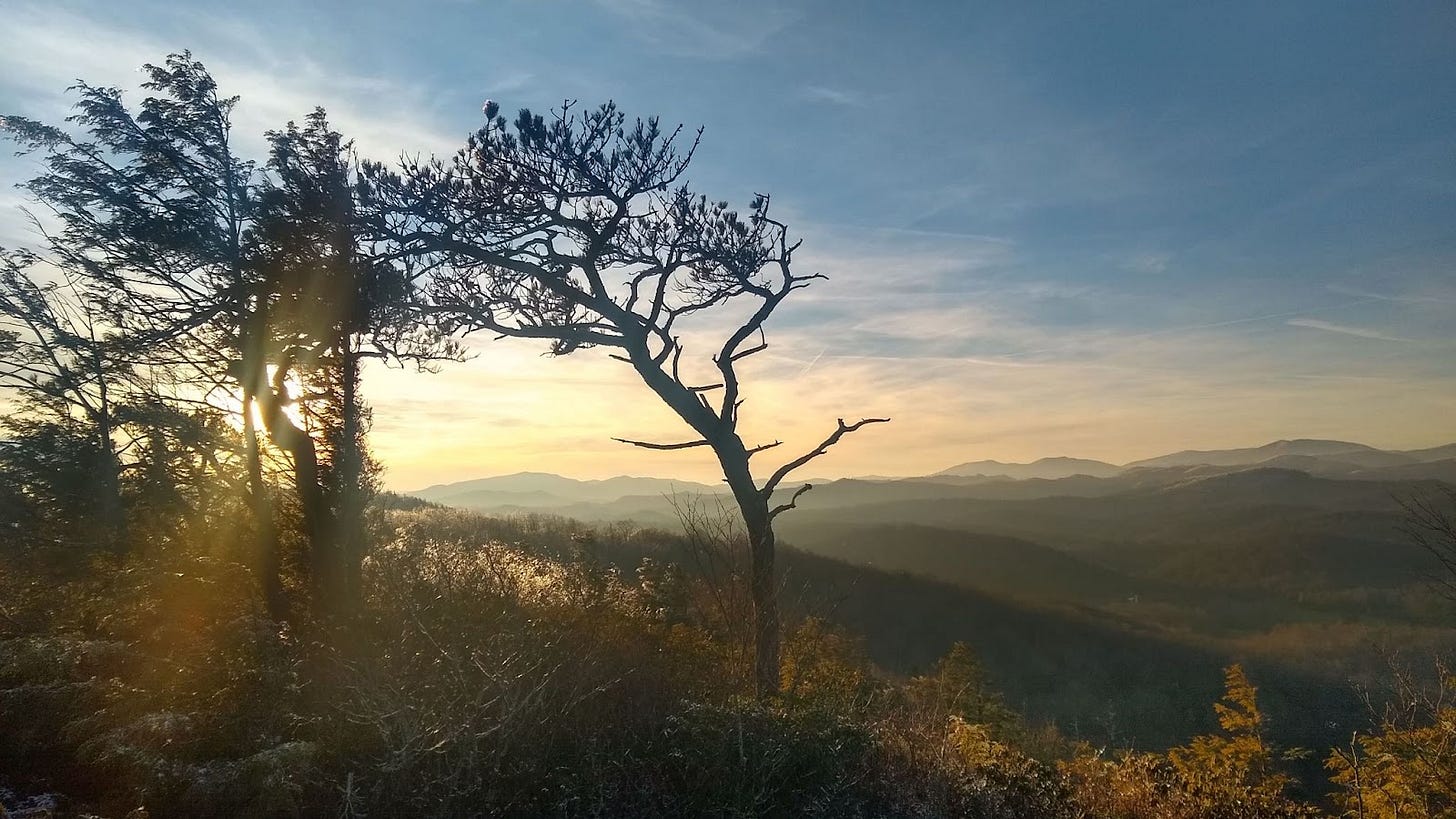
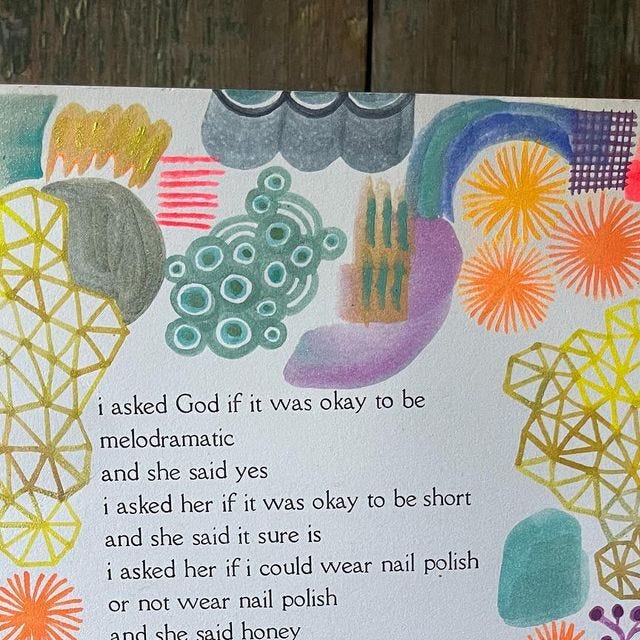
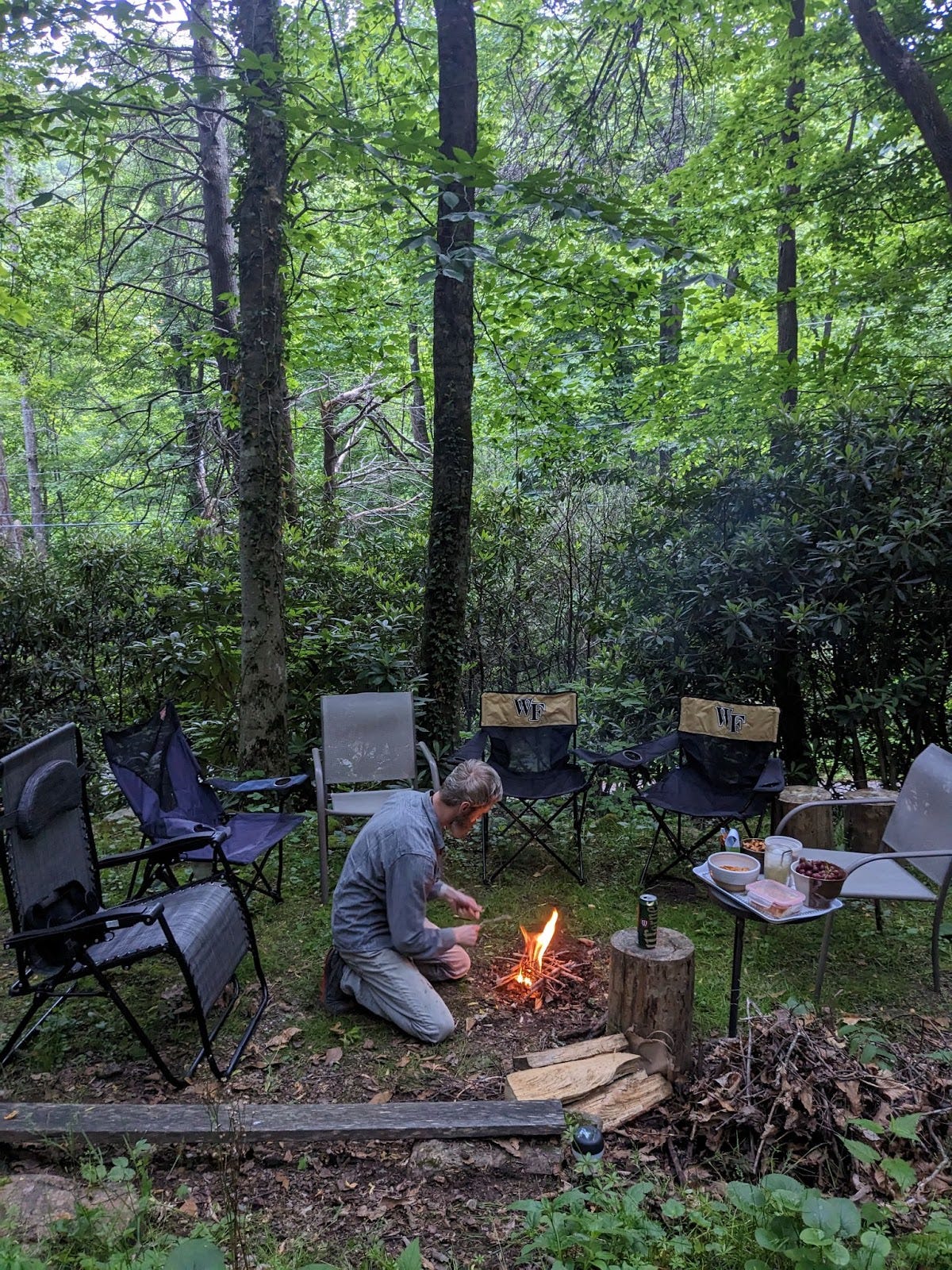
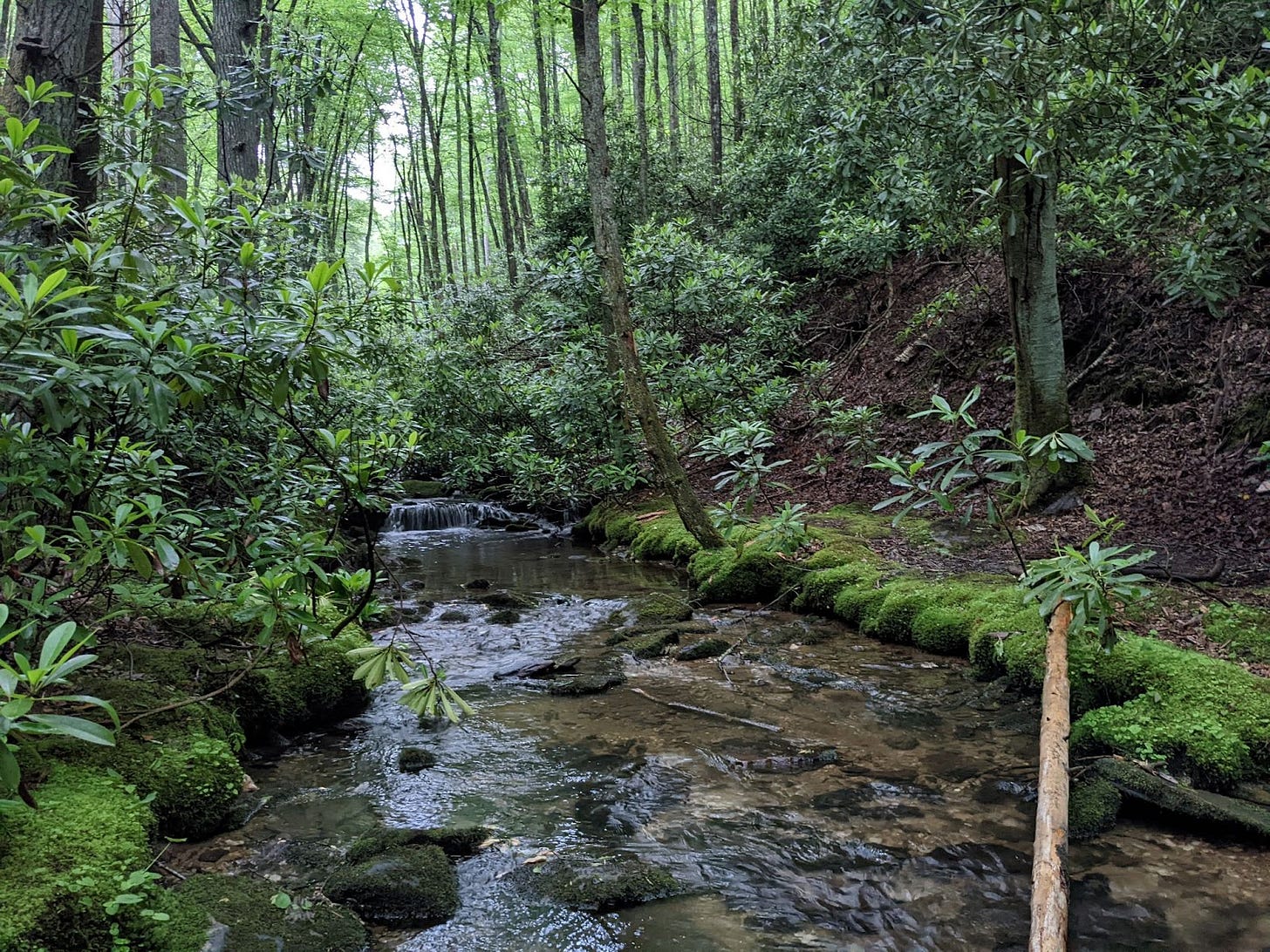
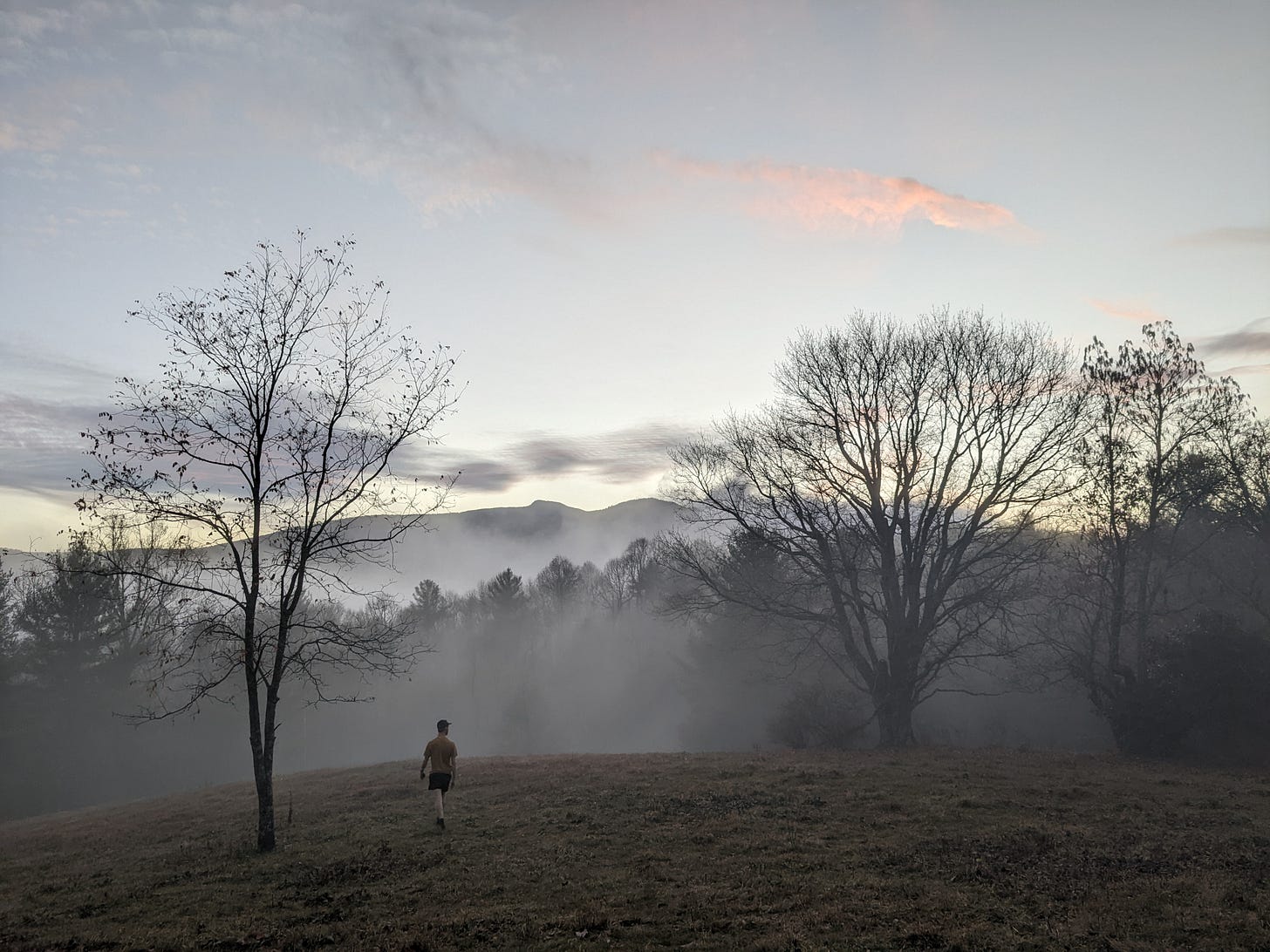
Hello Ryan Rose. I was wondering which theology schools those were, and then you provided them. :) Thank for the other resources as well. A wonderfully interesting interview!
Thanks so much for calling my attention to this beautiful interview, Ryan.